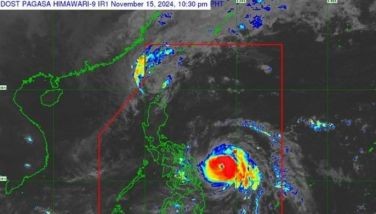Int'l group to Philippines: Provide livelihood for typhoon victims
MANILA, Philippines — A year after typhoon “Yolanda" battered the country, a humanitarian group urged the government to address poverty in affected areas, saying survivors are still having a hard time finding livelihood.
In a statement, Oxfam said the national government should comprehensively address remaining humanitarian needs while delivering “a scaled up, pro-poor recovery agenda."
"Close to a million people continue to live in inadequate shelters and are still struggling to find the resources to resume their livelihoods," Oxfam said.
LIVE BLOG: The Philippines a year after 'Yolanda'
The group said the affected families are facing "risks of deepening poverty in an already poor region."
Oxfam said the coconut farming and fishing were the worst hit by the typhoon. The group said around 13 million coconut trees were destroyed or damaged in Eastern Visayas alone.
"With key sources of income destroyed overnight, coconut farmers are left to grapple with delays in replanting crops caused by the slow pace of clearance of coconut lumber debris from their fields," Oxfam said.
Fishing communities, Oxfam added, are also facing declining catch after the typhoon.
"Despite the overwhelming aid of new boats and repairs from the government and aid groups, the larger issue remains to be the damage caused by the typhoon on fishing grounds and marine eco-systems," it said.
According to an Oxfam report, about 205,000 families are still waiting to be relocated into new houses to be built on safer land.
"The families often continue to live in makeshift shelters in areas prone to typhoons, flooding and other hazards. Others live in bunkhouses and tents across the affected regions," it said.
"As of October 2014, only 452 permanent new homes had been built, largely reflecting difficulties in buying safe land in the right place."
Justin Morgan, Oxfam’s Country Director in the Philippines, said displaced residents are concerned about their ability to earn an income as resettlement sites are far from their livelihood source.
"As so many of those targeted for resettlement continue to wait while living in inadequate and unsafe shelter, they often remain unsure of what basic services, such as water and education, will be in place," Morgan said.
"Too often people are left to choose between a place of safety and their ability to earn an income," he added.
Oxfam also claimed that disaster risk reduction measures like support for diversified agricultural activities and robust evacuation systems at resettlement sites are still lacking across many municipalities.
"If the population’s vulnerability that typhoon Haiyan (international name of ‘Yolanda’) rendered so starkly visible is not addressed, affected communities will remain in harm’s way - exposed to future disasters and deeper poverty," it said.
- Latest
- Trending




























